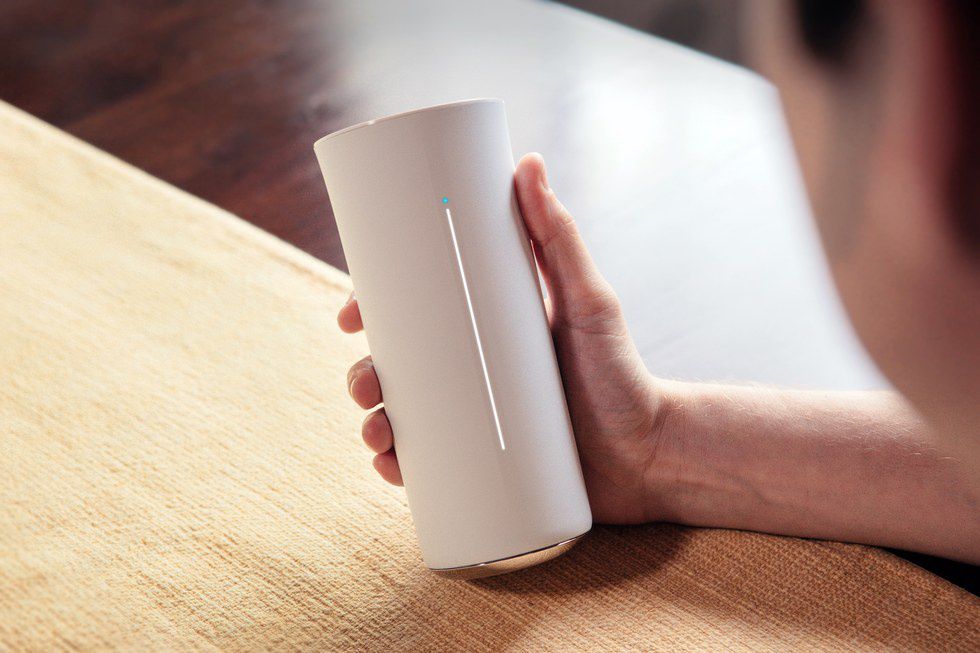Rewind almost two years ago to a time when I'm sitting on a couch with my friend Andrew. The bright white light of his laptop screen forces its way into my peripheral vision for the fifth time since we started watching TV. I turn to him and ask what is so important that he's been drooling over his computer instead of watching "Game of Thrones." Without hesitation, he flips the screen around to proudly display a picture of a cup. He anticipates my confusion and explains it's called a Vessyl. I stare blankly at him. "It's a cup," I say. The next five minutes consist of explanations dealing in how the Vessyl analyzes the content of drinks put into it and displays the nutritional information for easy diet tracking. "It's a cup." I joke that he could always just read the health label when he buys his food, but he's already put his money through the system and confirmed his order. I ask him when he'll get it and learn that the project is still in development but should ship in two or three months.
Kickstarter is a company that is displaying ideas and projects that people contribute money to directly rather than making a gamble as to whether a product suits them properly. Since the inception of crowd-funding sites like Kickstarter, the practice has exploded, reaching almost any type of project imaginable. Creators could pitch ideas for films directly to audiences and if that audience felt the idea matches up with something they want to see, they fund it. The idea was so exciting at that that time, it was a liberating middle-finger to the regular studio system maintaining so much creative control that tends to pull a lot of character out of these projects.
Fast forward to today, almost two years after Andrew spent a hundred dollars on his Vessyl and he still hasn't gotten it. In fact, the Vessyl is not only still in development, but the entire purpose and function of the product has changed. A new ship date came through saying that it's planned for release in the next year and a half, but again, it's all just promises.
So when it comes to this side of Kickstarter, what's happened? I think that we kind of bought into a story, it was a fun story and I bought into it too. However, the practical reality of it is that many of these projects are a lot more complicated than we initially thought. The idea of taking a concept and throwing money at it in the hopes that everything will work out, we'll have a warm embrace and revolutionize the process just doesn't happen that way. It's kind of like politics. You like having a sausage, but you don't want to know how it's made. It's that process behind the creation of products that's becoming laid bare through a lot of Kickstarters. I don't like the idea that people give money to a project and there is no accountability for what happens to it, but I know that isn't always the case.
Even though distance from the overarching reach of corporate producers is a goal, several problems can arise from crowd-funding, and they may not always be within the control of the people contributing funds. Products may not be representative of money that was raised, there are almost always hidden costs involved in production and the creep of the designs that go into it.
I don't think crowd-funding needs to be done away with entirely, but these problems may be indicative of a need to reevaluate the way we view things like Kickstarter. A way of looking at it in a more paired down way may be to say that a project could raise money to get a prototype, and the purpose of the prototype is to secure private funding in order to create a product that is actually representative of the promises being made to the consumers.
I tend to stay away from supporting crowd-funding campaigns, and not because I think the system can't work. There are well executed projects out there that deliver their products efficiently. However, one of the things that's really disturbed me about Kickstarter is that it's just ephemera. It's promises. There's just nothing that's really confident there a lot of the time.
As I'm writing this, I'm watching my friend Andrew pull his laptop up again to double check the status of his Vessyl order. There's been a new update. After almost two years of development on this product, a decision has finally been reached on the type of material to make it out of and they have a basic shape design as well. Andrew closes his laptop, drumming his fingers slowly and admits he may need to be more careful with what he gives his money to on Kickstarter. After two years and a hundred dollars, this project has promised him what he's already got a dozen of in a kitchen cabinet. A cup.






















 sunrise
StableDiffusion
sunrise
StableDiffusion
 bonfire friends
StableDiffusion
bonfire friends
StableDiffusion
 sadness
StableDiffusion
sadness
StableDiffusion

 purple skies
StableDiffusion
purple skies
StableDiffusion

 true love
StableDiffusion
true love
StableDiffusion
 My Cheerleader
StableDiffusion
My Cheerleader
StableDiffusion
 womans transformation to happiness and love
StableDiffusion
womans transformation to happiness and love
StableDiffusion
 future life together of adventures
StableDiffusion
future life together of adventures
StableDiffusion





















